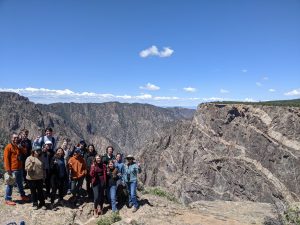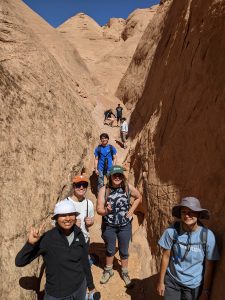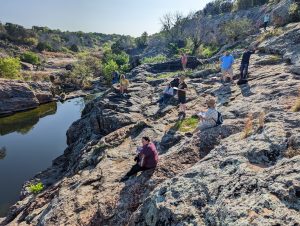Teaching
Since starting at UT, teaching is probably the area in which I’ve learned and grown the most. I am excited to be engaged in various education initiatives and challenges.
In addition to the classes I teach at UT, I am the Faculty Lead for OnRamps Earth Wind and Fire, a dual-enrollment UT course taught for college credit to high school students across Texas. OnRamps EWF functions and succeeds through the hard work of many individuals. It is primarily through my roles in guiding the course, training high school teachers and learning from them that I have become interested in education issues, from effective learning methods to recognizing all of the other pieces of life that need to fall into place for students to be engaged in learning.

Jackson Scholars at Black Canyon of the Gunnison National Park, Colorado, May 2022
Along with Dr. Mary Poteet, I also co-direct the Jackson Scholars program, which provides undergrads with outreach, leadership, research and professional development opportunities that go beyond typical classroom education, and a community of fellow students with which to engage in these activities. And field trips.

Jackson Scholars exploring a slot canyon near the Henry Mtns, Utah, May 2022
Geo 302E Earth Wind and Fire
This course is designed to introduce Earth sciences for non-geoscience majors, focusing on topics that affect and are affected by humans: natural hazards, anthropogenic climate change, evolution, and Earth resources that we all consume. I think of it as geosciences literacy—what every educated person should understand about the functioning of Earth and human environments. For example, climate change is an excellent topic for demonstrating how many different types of data (historical records, sediment and ice core proxies, numerical modeling, oceanography, etc.) are synthesized and understood together, allowing hypotheses to be tested and improved and new predictions made—in other words, the scientific method. The public and political debate over anthropogenic climate change shows how science gets applied imperfectly in the public realm, and yet is absolutely critical for solving grand challenges facing our (and other) species.
OnRamps Earth Wind and Fire
Approximately 1200 high school students across Texas are taking this course in academic year 2022-2023. While much of the content is the same in this and the Geo 302E version of Earth Wind and Fire, the course plays a somewhat different educational role: for most high school enrollees, this is the first Earth science course they take, and their first exposure to a wide range of scientific topics critical to understanding how humans affect the natural environment. It is well-documented that the geosciences are one of the least diverse STEM fields in terms of students from underrepresented groups both beginning and completing undergraduate degrees. While there are many challenging reasons for this, one key factor that can inhibit students from choosing to major in Earth science (compared to other STEM fields) in college is a lack of exposure to Earth sciences while in high school. Consistent with Texas high school demographics in general, over half of Onramps EWF students identify as Hispanic, demonstrating that our class reaches students underrepresented in Earth sciences.

OnRamps high school teachers on a field trip to Inks Lake State Park
Geo 365Q/385: Geomorphology Process and Form
This is a combined upper division undergrad/graduate class. For undergraduates, the course has a Quantitative Flag. A key educational goal is showing how complex feedbacks that shape Earth’s surface can be described and predicted with relatively simple mathematical formulas—this is a large part of what gets me excited about geomorphology. To paraphrase Richard Feynman, mathematics is the language of nature.
Geo 145E: Professional Ethics in Geosciences Seminar
While I love science—it is my professional life, and I believe critical to solving problems that threaten our species—there are many things I do not love about the scientific community. Being an ethical scientist and ethical human can be fraught with challenges. This class covers topics including scientific fraud, racial and sexual discrimination, sexual harassment and implicit bias in the scientific community, conflicts of interest, and ethics in communicating science to society. Should seismologists be prosecuted for misrepresenting earthquake risks? What are the impacts of switching from cars that use fossil fuels to cars that require large increases in lithium and cobalt mining?

